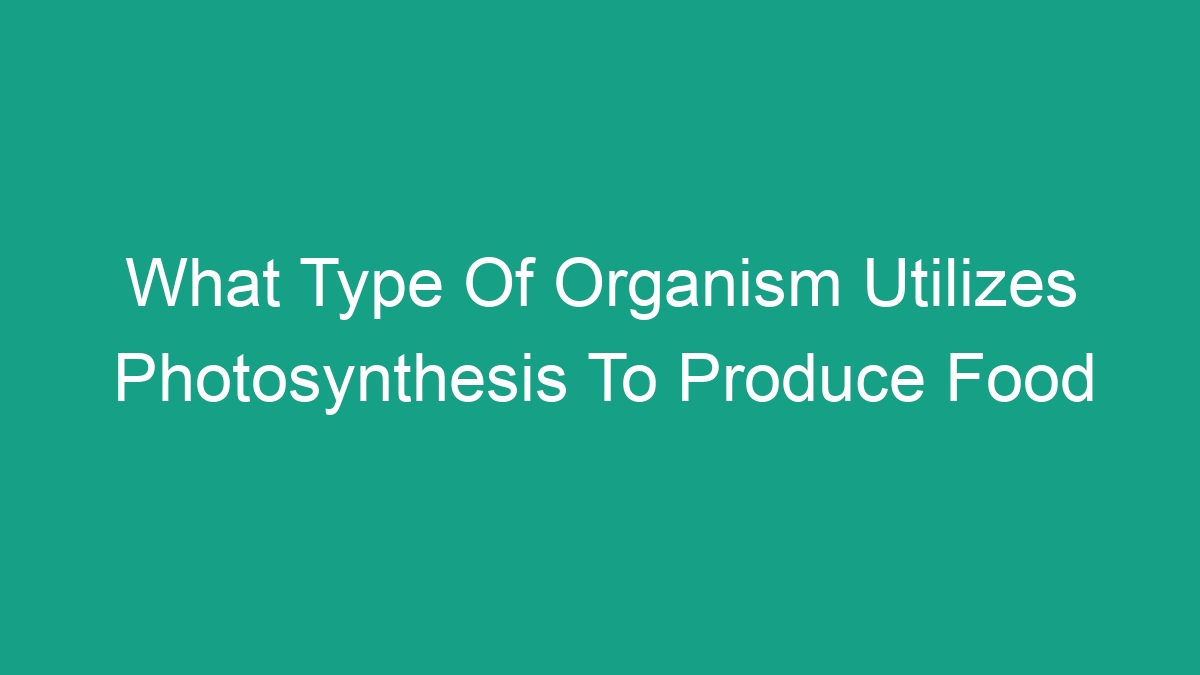
Understanding Photosynthesis and its Importance
Photosynthesis is a biological process by which green plants, algae, and some bacteria convert light energy, usually from the sun, into chemical energy in the form of glucose. This process is vital for the survival of many organisms as it is the primary source of organic compounds and oxygen in the atmosphere.
The process of photosynthesis can be broken down into two main stages: the light-dependent reactions, and the light-independent reactions (Calvin cycle). During the light-dependent reactions, light energy is used to split water molecules into oxygen, protons, and electrons. The Calvin cycle then uses these products to produce glucose from carbon dioxide.
Organisms that Utilize Photosynthesis
1. Plants: Plants are the most well-known organisms that utilize photosynthesis. Their leaves contain chlorophyll, the green pigment that captures light energy and starts the process of photosynthesis. Through this process, plants produce their own food, which is then used for energy and growth.
2. Algae: Algae are a diverse group of aquatic organisms that can range from single-celled to multicellular organisms. Like plants, algae contain chlorophyll and can perform photosynthesis to produce their own food. Algae play a crucial role in aquatic ecosystems as they are a primary food source for many aquatic organisms and are also responsible for a significant portion of the Earth’s oxygen production.
3. Cyanobacteria: Cyanobacteria, also known as blue-green algae, are a type of bacteria that can carry out photosynthesis. They are found in various environments, including freshwater, marine, and terrestrial habitats. Some cyanobacteria are capable of fixing nitrogen, which plays a key role in the global nitrogen cycle.
Importance of Photosynthesis
1. Oxygen Production: Photosynthesis is responsible for the production of oxygen in the atmosphere. Without this process, the levels of oxygen in the atmosphere would significantly decrease, posing a threat to the survival of many aerobic organisms, including humans.
2. Food Production: Photosynthesis is the foundation of the food chain. Plants, algae, and some bacteria are primary producers, meaning they are capable of producing their own food through photosynthesis. This food source serves as a vital energy and nutrient input for all other organisms in the ecosystem.
3. Carbon Dioxide Reduction: Photosynthesis plays a crucial role in reducing the levels of carbon dioxide in the atmosphere. This helps in mitigating the effects of climate change and global warming.
Challenges to Photosynthesis
While photosynthesis is a fundamental process, it is not without its challenges. Factors such as temperature, water availability, light intensity, and carbon dioxide levels can directly impact the rate of photosynthesis. Additionally, environmental stressors such as pollution and habitat destruction can also have adverse effects on the ability of organisms to carry out photosynthesis.
Research and Development
Scientists and researchers are continuously studying photosynthesis to gain a better understanding of this complex process. Their discoveries not only contribute to the fundamental knowledge of biology but also have practical applications. For example, the study of photosynthesis has led to the development of technologies aimed at improving crop productivity and creating sustainable energy sources.
One such area of research is biofuel production. By understanding the mechanisms of photosynthesis, scientists are working towards developing methods to efficiently convert biomass into biofuels. This has the potential to reduce our dependency on fossil fuels and mitigate the impacts of climate change.
Conclusion
In conclusion, photosynthesis is a vital process that sustains life on Earth. Through the utilization of light energy, plants, algae, and some bacteria are capable of producing their own food, which serves as the foundation of the food web and provides oxygen for aerobic organisms. Understanding the intricacies of photosynthesis is not only crucial for advancing our knowledge of biology but also for addressing pressing global challenges such as food security and climate change. As research in this field continues to progress, the potential for innovative applications of photosynthesis-related knowledge will undoubtedly expand.



